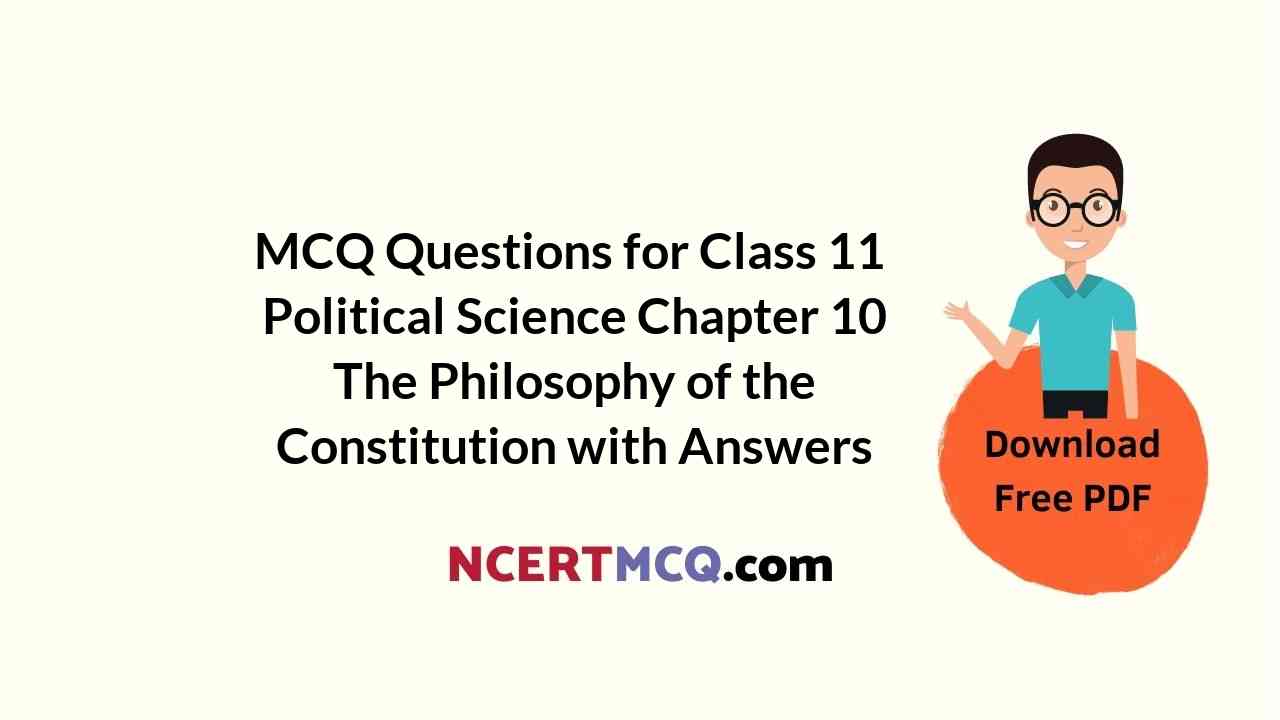Check the below NCERT MCQ Questions for Class 11 Political Science Chapter 10 The Philosophy of the Constitution with Answers Pdf free download. MCQ Questions for Class 11 Political Science with Answers were prepared based on the latest exam pattern. We have provided The Philosophy of the Constitution Class 11 Political Science MCQs Questions with Answers to help students understand the concept very well.
Class 11 Political Science Chapter 10 The Philosophy of the Constitution MCQ With Answers
Political Science Class 11 Chapter 10 MCQs On The Philosophy of the Constitution
The Philosophy Of The Constitution Class 11 MCQ Question 1.
The preamble was for the first time amended by the
(a) 42nd Amendment
(b) 44th Amendment
(c) 52nd Amendment
(d) 61st Amendment
Answer
Answer: (a) 42nd Amendment
MCQ Questions For Class 11 Political Science Chapter 10 Question 2.
Democracy is a government of the people, by the people, and for the people. Whose statements is it?
(a) Rousseau
(b) J.S. Mill
(c) T. H. Green
(d) Abraham Lincoln
Answer
Answer: (d) Abraham Lincoln
Class 11 Political Science Chapter 10 MCQ Question 3.
The procedural achievement reflects in
(a) Freedom to criticize the treatment of widows
(b) Taking decisions in the Constituent Assembly on the basis of reason
(c) Article 370 and 371
(d) Accepting the importance of community in an individual’s life
Answer
Answer: (b) Taking decisions in the Constituent Assembly on the basis of reason
Philosophy Of Constitution Class 11 MCQ Question 4.
Who argued that a state responsive to the needs of individuals must provide them the means by which their needs are communicated?
(a) Bal Gangadhar Tilak
(b) Rajaram Mohan Roy
(c) Bhagat Singh
(d) Jawahar lal
Answer
Answer: (b) Rajaram Mohan Roy
Philosophy Of Indian Constitution Class 11 MCQ Question 5.
In the Constituent Assembly of India, the Chairman of the Union Constitution Committee was
(a) Rajkumari Amrit Kaur
(b) G.V. Mavalankar
(c) Pt. Jawaharlal Nehru
(d) Dr. John Mathai
Answer
Answer: (c) Pt. Jawaharlal Nehru
Chapter 10 Political Science Class 11 MCQ Question 6.
The Preamble of our Constitution reads: India is a
(a) Socialist, Sovereign, Secular, Democratic Republic
(b) Secular, Socialist, Sovereign, Democratic Republic
(c) Sovereign, Socialist, Secular, Democratic Republic
(d) Secular, Sovereign, Democratic, Socialist. Republic
Answer
Answer: (c) Sovereign, Socialist, Secular, Democratic Republic
Philosophy Of The Constitution Class 11 MCQs Question 7.
Indian federalism has been constitutionally _______
(a) Symmetric
(b) Asymmetric
(c) Wide
(d) None of the above
Answer
Answer: (b) Asymmetric
Class 11 Political Science Chapter 10 The Philosophy Of The Constitution MCQ Question 8.
Which one of the following is not an essential feature of a democracy?
(a) Judiciary is responsible to the legislature
(b) Judiciary is independent
(c) The press is free
(d) There is the freedom to express public opinion
Answer
Answer: (a) Judiciary is responsible to the legislature
Class 11 Political Science Chapter 10 MCQ Question Answer Question 9.
Which was the first non-official attempt at drafting a constitution for India?
(a) Constitution of India Bill, 1892
(b) Constitution of India Bill, 1893
(c) Constitution of India Bill, 1894
(d) Constitution of India Bill, 1895
Answer
Answer: (d) Constitution of India Bill, 1895
Philosophy Of Indian Constitution MCQ Question 10.
Which of the following term is correct that means both religion and state must stay away from the internal affairs of one another.
(a) Mutual exclusion
(b) Internal exclusion
(c) Constitutional exclusion
(d) None of the above
Answer
Answer: (a) Mutual exclusion
Chapter 10 Class 11 Political Science MCQ Question 11.
The Japanese Constitution is popularly known as
(a) Complex constitution
(b) Advance constitution
(c) Peace constitution
(d) Concord constitution
Answer
Answer: (c) Peace constitution
Ch 10 Political Science Class 11 MCQ Question 12.
Which one of the following Fundamental Rights has been ensured to the citizens of India?
(a) To get education
(b) To get employment
(c) To buy and sell property
(d) To form associations or unions
Answer
Answer: (d) To form associations or unions
We hope the given NCERT MCQ Questions for Class 11 Political Science Chapter 10 The Philosophy of the Constitution with Answers Pdf free download will help you. If you have any queries regarding CBSE Class 11 Political Science The Philosophy of the Constitution MCQs Multiple Choice Questions with Answers, drop a comment below and we will get back to you soon.
Class 11 Political Science with Answers MCQ:
- Constitution: Why and How? Class 11 MCQ
- Rights and Duties in the Indian Constitution Class 11 MCQ
- Election and Representation Class 11 MCQ
- Executive Class 11 MCQ
- Legislature Class 11 MCQ
- Judiciary Class 11 MCQ
- Federalism Class 11 MCQ
- Local Governments Class 11 MCQ
- Constitution as a Living Document Class 11 MCQ
- The Philosophy of the Constitution Class 11 MCQ
